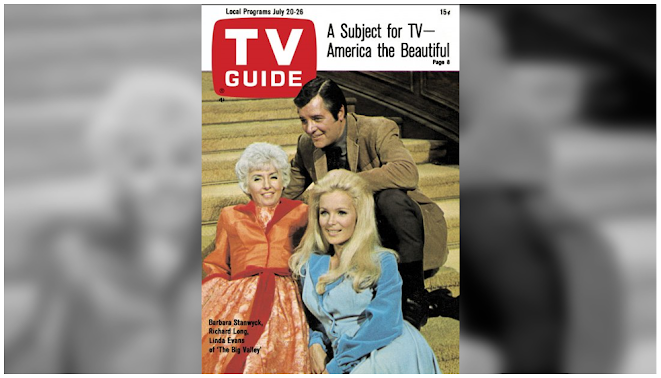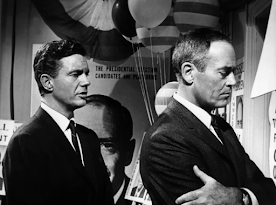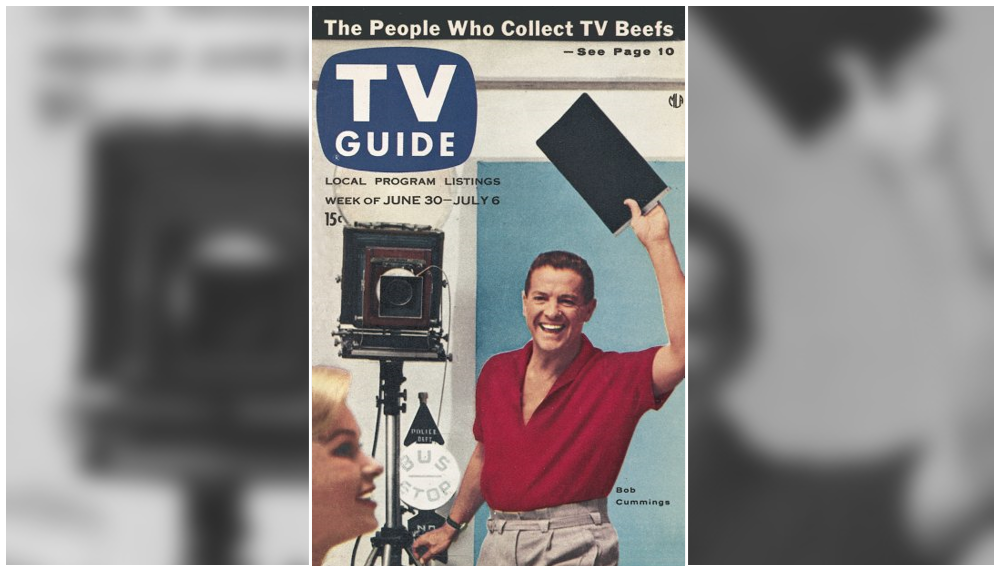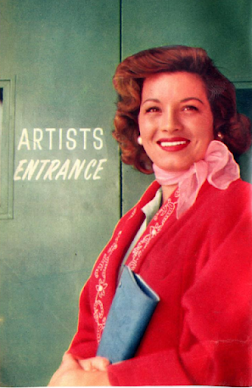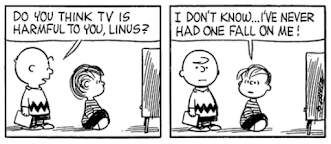You've probably seen the famous New Yorker illustration "View of the World from 9th Avenue," which depicts pretty much everything other than New York as a vast wasteland. Well, as Edith Efron points out, that's how network news tends to look at this country as well. And NBC's Bob Rogers wanted to correct that, so he conceived, produced, and wrote a documentary called "American Profile: Home Country USA," which presented a very different image of America than the one most people had been seeing. Aired on April 5, the day after the assassination of Martin Luther King Jr. and just weeks before the assassination of Robert F. Kennedy, the purpose of the program was to affirm that there was sanity in the midst of the insanity. "For the space of this program, let’s declare a cease-fire in the painful but necessary process of searching, scolding and scaring ourselves," began Chet Huntley's narration. "For a change, we will consider some of our virtues, instead of our faults."
The documentary took viewers on a tour of America, "from a ship-building seaport in Maine, to a Kansas dairy farm, to the tobacco country of south Virginia, to a South Carolina steel plant, to a Texas ranch, to the game-filled Montana mountains, to a Mexican-American town in Southern California." The stars were "the black and white citizens who inhabit the vast geographical expanse of this Nation—those we call the 'grass-roots' Americans." And the result was a program that reminded Americans that this is a big country with a lot that's good about it, a portrayal of "what is enduringly beautiful about the American character."
"The outstanding thing that unites them all is self-reliance," says Rogers. "Each is his own man. They all have strong convictions about what they want, and a willingness to do a fantastic amount of work to enable them to have the career they want and to live the way they want to live. They all have guts." Rogers calls them "The Forgotten Americans."
Why aren't these Forgotten Americans seen on TV? For too long, Efron feels, there's been a perception that "the self-reliant, productive American is 'extinct'—that this country is peopled largely by the dependent, the helpless, the hostile and the violent." TV has played its role in this perception. Rogers acidly notes that it's "Because everybody's covering urban problems," to which Huntly adds his agreement. "It’s true. Our attention has certainly been turned to the cities. That’s where the problems are." He adds, however, "But it is distorted. It doesn’t reflect the total country. We’re ignoring the rest of America."
The degree to which America is being ignored, Efron says, is "enormous." There are more than 200 million people in this country, but "With network news cameras focused on localized, if explosive, urban problems, often photographed in New York City, the mass of this Nation is invisible. TV’s domestic 'window on reality' is mainly showing us social 'evils.'""TV news isn't telling people the way life is," ABCs Howard K. Smith said recently. "Were giving the public a wholly negative picture on a medium so vivid that it damages morale with a bombardment of despair."
It also creates dissention, Efron finds, a view that America is "evil." Rogers says that "The imbalance in coverage is causing Americans to mistrust each other." President Johnson accused the news media of "bad-mouthing this country all day long," and said they have "a vested interest in catastrophe."
 |
| Rogers and cameramen Ken Resnick and Richard Norling film cattle in the Big Bend Country |
"Home Country USA" was a needed antidote, a reminder that while America does have real problems, it is also a good country. "It was like soothing balm," in the words of AP reporter Cynthia Lowry, while critic Percy Shain found it a reminder that "There's still a strong backbone running down our Nation's anatomy." People at NBC were moved as well; documentarian Lou Hazam said "It was so thrilling to see these people. They were so real. This show gave us the essence of the American character. The terrific integrity and self-reliance! I can’t tell you what it meant to me." And a viewer from Memphis, where King had been assassinated the day before, wrote to NBC that "With this sorrowful event in our city, most of us became depressed and almost defeated over today’s problems. Your program helped me to remember the rest of America."
Does this America, the real America, still exist? We could use our own "Home Country USA" today, to remind us that there is still goodness and decency in America. We need that reminder that what we see on television and what we read on social media is not the real world. There have been indications that the issues social media emphasizes, the conflicts that it inflames, are not those that consume the majority of Americans, that neither the far-left nor the far-right interest them that much. Now, it's true that this could be whistling in the dark, burying one's head in the sand, and that this equanimity simply allows evil to thrive and accelerates the disintegration of America and the world. When it comes to the future of this country, I'm among the most pessimistic.
But there's no doubt that this real America still exists as a home for most people, and we need to be reminded of that. As Efron says in conclusion, "The soothing 'balm' was the sight of American goodness. It is a vital necessity, in this troubled period of our history, to show it on the screen." It may be heartbreaking, but it may also be inspiring. It may suggest that it's not too late yet.
l l l
 During the 60s, the Ed Sullivan Show and The Hollywood Palace were the premiere variety shows on television. Whenever they appear in TV Guide together, we'll match them up and see who has the best lineup.
During the 60s, the Ed Sullivan Show and The Hollywood Palace were the premiere variety shows on television. Whenever they appear in TV Guide together, we'll match them up and see who has the best lineup.Sullivan: Ed’s guests are singers Eddie Fisher, the McGuire Sisters, and Lulu; comedians Jackie Vernon, Norm Crosby, Stiller and Meara, and Tommy Cooper; the Ballet America; and Baby Opal, performing elephant.
Palace: Jimmy Durante is the ringmaster for the Palace circus show. Jimmy sings "Be a Clown," "Buffoons" and "When the Circus Leaves Town." Honorary ringmistress: young Anissa Jones of Family Affair. Acts include Roselle Troupe, ariel acrobats; Kay's Pets, animal act; Linon, slack-wire clown; Sensational Parker, swaypole performer; Great Rudos, performing elephants; Candy Cavaretta, trapeze artist; Hanneford Family, clowns on horseback.
Circus shows can be very dull or very entertaining, depending on the quality of the acts and how you feel about circuses (and clowns). Without seeing Palace, we really don't have any way of knowing which one this is, even though Jimmy Durante is always entertaining. However, Ed has a full lineup of acts, most of them well-known, and with both the McGuire Sisters and Lulu, he's appealing to all the age groups tonight. So let's go with Sullivan this week.
l l l
 |
| As seen in Singer stores |
Continuing on this theme, Rod Serling is returning to televisison, "for at least one show. He's writing a script for NBC's Prudential's On Stage drama series. It'll be a political story tentatively entitled "Certain Honorable Men." That is, indeed, how it comes out when it's broadcast on September 12, with Van Heflin starring as a powerful but corrupt congressman, and Peter Fonda and Alexandra Isles as the staffers who discover the truth of his activities and turn on him. Although the soundtrack for this drama still exists, this is thought to be one of those "lost" broadcasts that so irritates historians like me. Having perhaps learned from his previous frustrations at with contemporary television writing, Serling here chooses not to focus on a specific issue, but on the values of the people who represent us in office. And of course we all know this won't be Serling's last go with television; he'll be back next year with Night Gallery.
There's also mention of Academy Award-winning actress Miyoshi Umeki joining the cast of The Courtship of Eddie's Father, a pilot for a proposed series on ABC starring Bill Bixby. That's one pilot that does indeed make the schedule, and it has a three-season run. One show that doesn't, apparently, come to fruition: the Singer Company is talking with the Beatles about an American TV apperance. As far as I know that never happens, but Singer does have a very successful series of music specials that they sponsor—including the Elvis Comeback Special.
l l l
Along with our regular fare, we've got some excellent movies airing on network and local television this week, led by a repeat of The Best Man (Friday, 9:00 p.m., CBS), Gore Vidal's savage 1964 story of presidential candidates vying for the nomination at their party's national convention. Judith Crist says that the movie "achieves near-thriller status with the almost unbearable tension building from a man’s reconsideration of his own moral values and the suspense dependent on how far a demagogue’s passions can carry him." Henry Fonda stars as the moral man who may not have the inner strength to be a leader; Cliff Robertson is his opponent, unscrupulous but with the qualities to be a decisive president; and Lee Tracy as the former president whose endoresement everyone values, but who has his doubts. It's well-made, well-acted, and well-written, and no wonder it shows up on by quadrennial list of favorite political movies.
Champagne for Caesar (Saturday, 9:00 p.m., KBHK in San Francisco) is a witty 1950 satire on television and quiz shows, featuring Ronald Colman as a polymath determined to break the bank on a quiz show; Vincent Price as the show's sponsor, whose refusal to give Colman a job spurs the revenge plot; and Art Linkletter as the show's smarmy host. Critics weren't all that high on it, but I've found it as a very funny take on an industry that deserves spoofing.
Sunday's movie classic is one of the most influential of horror films, 1941's The Wolf Man, starring Lon Chaney Jr. as the title creature (a character he'd reprise in four sequels), with Claude Rains, Ralph Bellamy, Warren William, and Bela Lugosi rounding out a top-notch cast. If you've already seen enough werewolves, you might prefer heading down to the Pecan Valley Country Club in San Antonio for the final round of golf's last major of the season, the 50th PGA Championship (2:00 p.m., ABC). At age 48, Julius Boros masters the sweltering heat for a one-shot victory over Arnold Palmer (who misses an eight-foot putt on 18 to tie) and Bob Charles; third-round leaders George Archer and Marty Fleckman finish another stroke back.
Also on Sunday: The 21st Century (4:30 p.m., CBS) looks at the medical and lifestyle advances that may make it possible to extend average life expectancy to age 100. It's a wistful hope, looking at it in retrospect; the latest statistics show that life expectancy in the United States has dropped for the second consecutive year. In 2019 it was nearly 79, but by last year it had fallen to just over 76; I wonder how much those supposed medical advances have had to do with it? And speaking of failed medical experiments, Jack Palance (right) stars in The Strange Case of Dr. Jekyll and Mr. Hyde (9:00 p.m., ABC), a Dan Curtis production that originally starred Jason Robards, but was interrupted by a strike (fancy that); when filming resumed, Robards was unavailable and Palance stepped in.
Monday gives viewers some tough choices, including the classics Damn Yankees (8:00 p.m., KRON, San Francisco), with Tab Hunter, Gwen Verdon, and Ray Walston; and The Quiet Man (8:30 p.m., KCRA, Sacramento), starring John Wayne, Maureen O'Hara, and Barry Fitzgerald. And if those don't provide enough star power, The Lucy Show (8:30 p.m., CBS) finds Lucy at a Hollywood premiere, with cameos from Kirk Douglas, Edward G. Robinson, Jimmy Durante, and Vince Edwards.
Remember how, when a network movie ran short, the network filled the remainng time with a short film? We've got some examples of that this week; on Tuesday, CBS follows the movie Mister Moses ("tastless idiocy," according to Crist) with "a preview of fall shows" that was probably an abbreviated version of this. (9:00 p.m.) Wednesday, ABC does something similar, following the 9:00 p.m. movie Ski Party (starring Frankie Avalon, Dwayne Hickman, and Yvonne Craig) with "highlights of 1967 college football games," including this showdown for #1 between USC and UCLA. What would they do nowadays to fill the time until the local news? Probably add more commercials—but I forgot; they don't show movies on network TV anymore.
On Thursday, Julie London and her husband, Bobby Troup, headline the monthly Something Special (9:00 p.m., KTVU in Oakland), with the Hi-Los and bandleader Jerry Fielding. That's up against the CBS Thursday movie Tickle Me (9:00 p.m.), with Elvis as an unemployed rodeo star. By the way, that doesn't fill up the entire hour and 55 minutes, so it's followed by "a behind-the-scenes look a the filming of Funny Girl, with Barbra Streisand.*" (Something like this.) And in case you're wondering why the movie slot was only 1:55, the final five minutes was filled by a political talk from presidential candidate Nelson Rockefeller.
*Spelled "Barbara" in the listings, but I've taken the liberty of making the correction.
l l l
Richard Long is the subject of Dwight Whitney's cover story, and he comes across not only as a successful actor, but a very nice man. He's known for his stints in the WB detective shows Bourbon Street Beat and 77 Sunset Strip, and he's now one of the stars of ABC's Western The Big Valley. Not only that, he's also honing his chops as a director, helming the first episode of the fourth season. He's described as "Cool, intelligent, bright!" by co-producer Arthur Gardner, who adds, "If we didn't need him so much as an actior, e'd make a fine director."
Long is known on-set for being calm, cool, and collected. Steady and dependable are words used to describe him, and nothing, but nothing, seems to get to him. He concedes it's an "insane" business, but says, "I have a great deal of respect for it. I see it as a job, a craft. That part turns me on," and Whitney notes that his directing success is a good thing for a man who's always been uncomfortable with the idea of stardom, which he sees as "frightening."
Throughout a life that's had its ups and downs, he's maintained that steadiness. His first marriage, to actress Suzan Ball, ended when she died of cancer after 14 months. She was diagnosed shortly after they started going together, but they married anyway. "We all lose, and you have to be prepared for that," he says. "You learn from it. You have to allow it to happen. There is a suffering period and life goes on again. His second, to acress Mara Corday*, has been stormy, but despite threats and divorce filings on both sides, they remain together and the marriage maintains a kind of rocky stability that lasts for the remainder of his life.
*Who appeared in the MST3K classic The Black Scorpion.
The Big Valley runs for four seasons; after that, Long co-stars with Juliet Mills in the much-loved Nanny and the Professor for a couple of years, followed by the short-lived Thicker Than Water with Julie Harris. Having a history of heart trouble, he dies of a heart attack in 1974, at only 47. But the closing quote from a friend seems to sum up his career and his life very well: "It is the nobility of being content to be exactly what you are."
l l l
MST3K alert: Eegah! (1962) A prehistorictype giant living in the desert falls in love with the teen-age girl who discovers him. Arch Hall Jr., Marilyn Manning, Richard Kiel. (Friday, 9:00 p.m., KMEO in San Francisco) Looking at the cast, you have three guesses as to who plays the prehistoric giant, and the first two guesses don't count. This movie was made the same year as Kiel's famous appearance in "To Serve Man" on The Twilight Zone; it's one of three appearances he makes on MST3K. Believe me, by the end of this one, you'll be rooting for him against the people he's supposed to be terrorizing. TV


